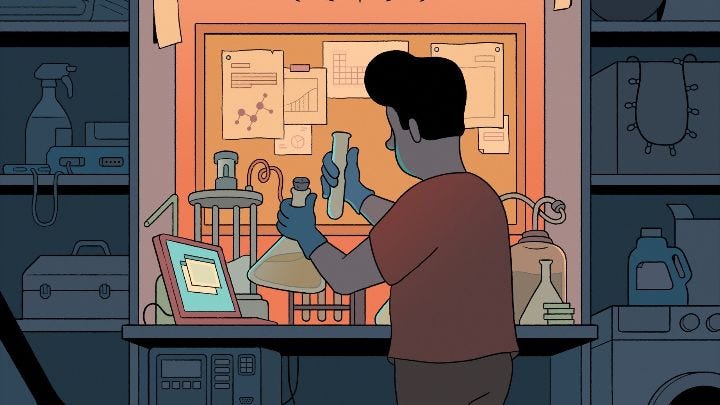H+ Weekly - Issue #259
View this email in your browser
This week - AI efficiency outpaces Moore's Law; Microsoft builds 5th most powerful computer for AI; the rogue experiments; dead robots; and more!
MORE THAN A HUMAN
► Hacking Darwin: Genetic Engineering and the Future of Humanity (1:35:44)
Here is the recording of the recent London Futurists meeting where Jamie Metzl, Nessa Carey and Joyce Harper discussed how genetic engineering will impact the future of humanity - either improve our well-being or descend us into a dangerous genetic arms race.
ARTIFICIAL INTELLIGENCE
OpenAI Finds Machine Learning Efficiency Is Outpacing Moore’s Law

Using a new metric to measure for machine learning efficiency, researchers from OpenAI have found that AI efficiency doubled every 16 months since 2012, outpacing Moore’s Law. Image recognition AI in 2019 needed 44 times less computing power to achieve AlexNet-like (state of the art image recognition software in 2012) performance.
Microsoft OpenAI computer is world's 5th most powerful
Microsoft announced that it has built the fifth most powerful computer on Earth. Packed with 285,000 processor cores and 10,000 GPUs, the supercomputer was built in collaboration with OpenAI and will operate as part of Microsoft's Azure cloud computing system. The technology giant expects to achieve significantly better results from a single massive supercomputer system than from large numbers of smaller, isolated models.
This Lab ‘Cooks’ With AI to Make New Materials
Instead of checking 12,229 potential candidates for new material on a supercomputer, material scientists trained a machine-learning algorithm to make simulations quickly. The research described here is an example of how material science is looking into AI and automation to speed up the discovery process for new materials.
► OpenAI Model Generates Python Code (3:59)
Researchers from OpenAI trained a text-generator AI on thousands of open-source code samples to create an AI that can generate code. Just write in plain English what do you want the code to do and the AI will generate the code for you. Should programmers start to worry about AI taking their job now?
AI-Powered Biotech Can Help Deploy a Vaccine In Record Time
The COVID-19 crisis we are in right now forces biotech and pharma industries to speed up the research of a vaccine for the disease. AI can be a helpful tool here - it can check candidate molecules quickly and narrow down possible vaccines and move the most promising ones to human trials.
ROBOTICS

Dead Robots is a series I have started to share the stories of robots that failed and the companies behind them. The first story is about MegaBots - a company that built big combat robots, challenged Japanese mecha for a duel and promised a league for giant fighting robots. Please let me know what do you think about it!
Robots and cameras: China's sci-fi quarantine watch
Chinese methods of enforcing quarantine look like from dystopian sci-fi - people in hazmat suits, cameras and robots delivering food.
BIOTECHNOLOGY

DIY-bio and biohackers have been for years working on projects like open-sourcing insulin, democratizing access to bioengineering or trying to fix the broken pharmaceutical and healthcare systems. I like how this article portraits DIY-bio, its history and philosophical roots. It also points out that the current COVID-19 crisis is forcing academia to adapt some of their principles of open-source and collaborative science, so maybe something good will come out of this pandemic.
A coming bio revolution is poised to change the world
Biotech is going to change the world. As this article points out, "60% of the physical inputs to the global economy — think food, fuel, even the fabric of our clothes — could be produced through bioinnovations" and improving human healthspan, can have a direct economic impact of up to $4 trillion a year over the next 10 to 20 years.
Bioinspired micro-robot based on white blood cells
A team of scientists invented a tiny micro-robot that resembles a white blood cell travelling through the circulatory system. It has the shape, the size and the moving capabilities of leukocytes, and could perhaps revolutionize the minimally invasive treatment of illnesses.
CLOSING NOTES
Dan Norton is carrying out research to identify whether Artificial Intelligence, as it becomes more entrenched in our world, can be considered a legitimate part of society. He created this survey and you can help him by filling it out.
Shoutout to Weekly Robotics for being a great source of robotics news and resources. I highly recommend signing up to their newsletter if you are into robotics.
Thank you for subscribing,
Conrad Gray (@conradthegray)
If you have any questions or suggestions, just reply to this email or tweet at @hplusweekly. I'd like to hear what do you think about H+ Weekly.
Follow H+ Weekly!


